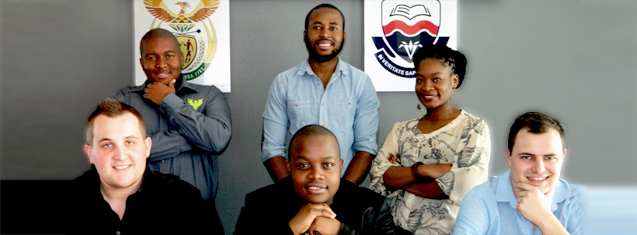
Front, from the left: Michael van Niekerk, Thabiso Letselebe and William Clayton; Back, from the left: Gopolang Kgaile, Thokozane Mahlanga and Mpho Sefo; Lisa Coetzee and Lehlohonolo Mofokeng were not present during the taking of the photograph.
Eight Kovsies have been selected as part of 100 delegates for the 2014 Brightest Young Minds (BYM) summit.
Thabiso Letselebe (Chief Delegate of the UFS BYM), Michael van Niekerk, William Clayton, Gopolang Kgaile, Thokozane Mahlanga, Mpho Sefo, Lisa Coetzee and Lehlohonolo Mofokeng will attend the BYM summit from 29 August to 2 September 2014 in Johannesburg.
BYM is a youth-driven non-profit organisation that identifies South Africa’s most passionate young people. The organisation equips these young leaders with the skills and networks needed to create positive change.
Each year, 100 participants are invited to a five-day summit, based on criteria of innovation, leadership, civic responsibility and academic accomplishment. Delegates discuss challenges facing the nation with respected leaders and then design start-up like solutions to these challenges.
Post-summit alumni have access to resources for success and BYM continues to encourage social entrepreneurship. BYM has demonstrated success in mobilising young people for nearly fifteen years.
BYM has been the launch pad for several successful business and social endeavours. Some of the ideas developed by BYM alumni include the AIDS Industry Management Standard, Taxi Smart Card System, MiniSass Water Monitoring System, Investec Young Women in Finance conference, Tertiary School in Business Administration, Twenty30 and Women in Engineering.
BYM attracts a diverse group of participants in terms of academic, racial, geographic and socio-economic backgrounds. In a society marred by divides, BYM is proving the power of diversity. The organisation’s participants would not be as successful in moving the nation forward if it were not for the diversity of their experience.